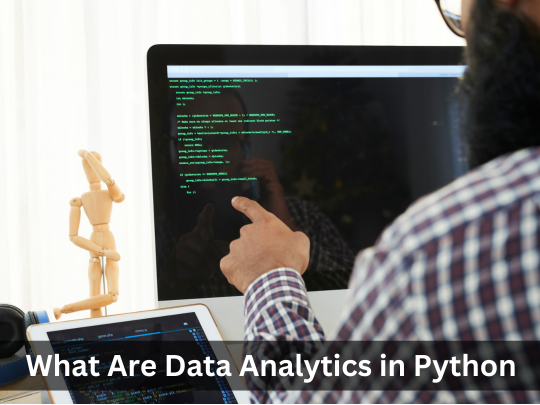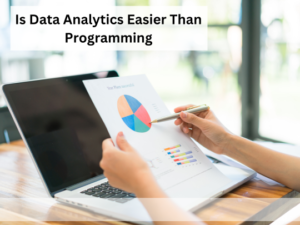Data analytics in Python refers to the process of using Python programming language and related libraries to analyze and interpret data. Python has become one of the most popular programming languages for data analysis due to its ease of use, wide range of libraries, and powerful features.
Python’s data analytics libraries such as NumPy, Pandas, and Matplotlib provide a range of tools for data manipulation, analysis, and visualization. NumPy provides powerful mathematical and numerical operations, while Pandas provides tools for data manipulation, such as filtering, grouping, and merging. Matplotlib is a plotting library that allows for the creation of a variety of graphs and visualizations.
Data analytics in Python involves importing data into Python, cleaning and pre-processing it as needed, and then using statistical and machine learning techniques to analyze and draw insights from the data. Python can be used for a variety of data analysis tasks, such as exploratory data analysis, data visualization, predictive modelling, and more.
Kickstart your career by enrolling in this data analytics courses in Pune with placement.
Importing Data:
One of the first steps in data analytics with Python is to import data into the environment. This can be done with a variety of libraries, such as Pandas, NumPy, or CSV. Once the data is imported, it can be stored in a Data Frame or other data structure for further analysis.
Cleaning and Pre-processing Data:
Before analyzing data, it is often necessary to clean and pre-process it. This can include removing duplicates, filling in missing values, or converting data types. Python provides a variety of tools and functions for data cleaning and pre-processing, such as Pandas’ drop_duplicates() function or filling () function.
Exploratory Data Analysis:
Exploratory data analysis (EDA) involves visually exploring and summarizing data to gain insights and identify patterns. Python provides a variety of libraries and tools for EDA, such as Matplotlib, Seaborn, or Plotly. These libraries can be used to create a variety of visualizations, such as scatter plots, histograms, or heat maps.
Earn yourself a promising career in data science by enrolling in the Masters in data analyst course with placement Program offered by 360DigiTMG.
Data Visualization:
Data visualization is a critical component of data analytics, as it allows for the communication of insights and findings. Python provides a variety of libraries and tools for data visualization, such as Matplotlib, Seaborn, Plotly, or Bokeh. These libraries can be used to create a variety of visualizations, such as line charts, bar charts, or choropleth maps.
Statistical Analysis:
Python provides a variety of statistical analysis tools and libraries, such as SciPy or Stats models. These libraries can be used to perform various statistical analyses, such as hypothesis testing, regression analysis, or time series analysis.
Machine Learning:
Python has become a popular choice for machine learning due to its ease of use and powerful libraries, such as Scikit-learn or TensorFlow. Python can be used for a variety of machine-learning tasks, such as classification, regression, or clustering.
Web Scraping:
Python provides a variety of libraries for web scraping, such as BeautifulSoup or Scrapy. Web scraping involves extracting data from websites, which can be useful for a variety of data analytics tasks, such as market research or sentiment analysis.
Wish to pursue a career in data analytics? Enroll in this data analyst training and placement in Bangalore to start your journey.
Data Analytics:
Learn the core concepts of the Data Analytics Course video on YouTube:
Natural Language Processing:
Python also provides a variety of tools for natural language processing (NLP), such as NLTK or spaCy. NLP involves using algorithms to analyze and understand human language, which can be useful for a variety of data analytics tasks, such as sentiment analysis or text classification.
Big Data Analytics:
Python can also be used for big data analytics, with libraries and tools such as Apache Spark or Dask. These libraries provide distributed computing capabilities, allowing for the analysis of large datasets that may not fit into memory on a single machine.
Pursue a career in Data Analytics with the number one training institute 360DigiTMG. Enroll in the best data analyst course in Chennai to start your journey.
Data Science Process:
Python provides a powerful platform for the entire data science process, from data collection to deployment. The data science process typically involves the following stages: problem formulation, data collection, data preparation, exploratory data analysis, statistical analysis, machine learning, and deployment. Python provides libraries and tools for each of these stages, allowing for a streamlined and efficient data science workflow.
Libraries and Frameworks:
Python’s popularity for data analytics can be attributed in part to its vast ecosystem of libraries and frameworks. These libraries and frameworks provide a variety of tools and capabilities, from data manipulation to machine learning to web development. Some popular libraries and frameworks for data analytics in Python include Pandas, NumPy, Scikit-learn, TensorFlow, Keras, Flask, and Django.
Don’t delay your career growth, kickstart your career by enrolling in this data analyst training institutes in Hyderabad with 360DigiTMG Data Analytics course.
Data Science Placement Success Story
Best Practices for Data Analytics in Python:
When working with data in Python, there are several best practices to follow to ensure accurate and efficient analysis:
Document code and processes:
Documenting code and processes is essential for reproducibility and collaboration. It can also help catch errors or inconsistencies in the data analysis.
Use version control:
Version control tools such as Git can help track changes and collaborate with others.
Write modular code:
Writing modular code can help make code more reusable, easier to understand, and more efficient.
Test code:
Testing code can help catch errors early on and ensure the accuracy of the analysis.
Optimize code:
Optimizing code can help make analysis more efficient and scalable, particularly when working with large datasets.
Follow data privacy and security guidelines:
It’s important to follow data privacy and security guidelines to protect sensitive data.
Data Science Training Institutes in Other Locations
Tirunelveli, Kothrud, Ahmedabad, Hebbal, Chengalpattu, Borivali, Udaipur, Trichur, Tiruchchirappalli, Srinagar, Ludhiana, Shimoga, Shimla, Siliguri, Rourkela, Roorkee, Pondicherry, Rajkot, Ranchi, Rohtak, Pimpri, Moradabad, Mohali, Meerut, Madurai, Kolhapur, Khammam, Jodhpur, Jamshedpur, Jammu, Jalandhar, Jabalpur, Gandhinagar, Ghaziabad, Gorakhpur, Gwalior, Ernakulam, Erode, Durgapur, Dombivli, Dehradun, Cochin, Bhubaneswar, Bhopal, Anantapur, Anand, Amritsar, Agra , Kharadi, Calicut, Yelahanka, Salem, Thane, Andhra Pradesh, Greater Warangal, Kompally, Mumbai, Anna Nagar, ECIL, Guduvanchery, Kalaburagi, Porur, Chromepet, Kochi, Kolkata, Indore, Navi Mumbai, Raipur, Coimbatore, Bhilai, Dilsukhnagar, Thoraipakkam, Uppal, Vijayawada, Vizag, Gurgaon, Bangalore, Surat, Kanpur, Chennai, Aurangabad, Hoodi,Noida, Trichy, Mangalore, Mysore, Delhi NCR, Chandigarh, Guwahati, Guntur, Varanasi, Faridabad, Thiruvananthapuram, Nashik, Patna, Lucknow, Nagpur, Vadodara, Jaipur, Hyderabad, Pune, Kalyan.
Data Analyst Courses In Other Locations
Tirunelveli, Kothrud, Ahmedabad, Chengalpattu, Borivali, Udaipur, Trichur, Tiruchchirappalli, Srinagar, Ludhiana, Shimoga, Shimla, Siliguri, Rourkela, Roorkee, Pondicherry, Rohtak, Ranchi, Rajkot, Pimpri, Moradabad, Mohali, Meerut, Madurai, Kolhapur, Khammam, Jodhpur, Jamshedpur, Jammu, Jalandhar, Jabalpur, Gwalior, Gorakhpur, Ghaziabad, Gandhinagar, Erode, Ernakulam, Durgapur, Dombivli, Dehradun, Bhubaneswar, Cochin, Bhopal, Anantapur, Anand, Amritsar, Agra, Kharadi, Calicut, Yelahanka, Salem, Thane, Andhra Pradesh, Warangal, Kompally, Mumbai, Anna Nagar, Dilsukhnagar, ECIL, Chromepet, Thoraipakkam, Uppal, Bhilai, Guduvanchery, Indore, Kalaburagi, Kochi, Navi Mumbai, Porur, Raipur, Vijayawada, Vizag, Surat, Kanpur, Aurangabad, Trichy, Mangalore, Mysore, Chandigarh, Guwahati, Guntur, Varanasi, Faridabad, Thiruvananthapuram, Nashik, Patna, Lucknow, Nagpur, Vadodara, Jaipur, Hyderabad, Pune, Kalyan, Delhi, Kolkata, Noida, Chennai, Bangalore, Gurgaon, Coimbatore.
For more information
360DigiTMG – Data Analytics, Data Science Course Training Hyderabad
Address – 2-56/2/19, 3rd floor,,
Vijaya towers, near Meridian school,,
Ayyappa Society Rd, Madhapur,,
Hyderabad, Telangana 500081
099899 94319
https://goo.gl/maps/sn21C9xFtMbCr4qm8
Source Link : What are the Best IT Companies in Uppal


